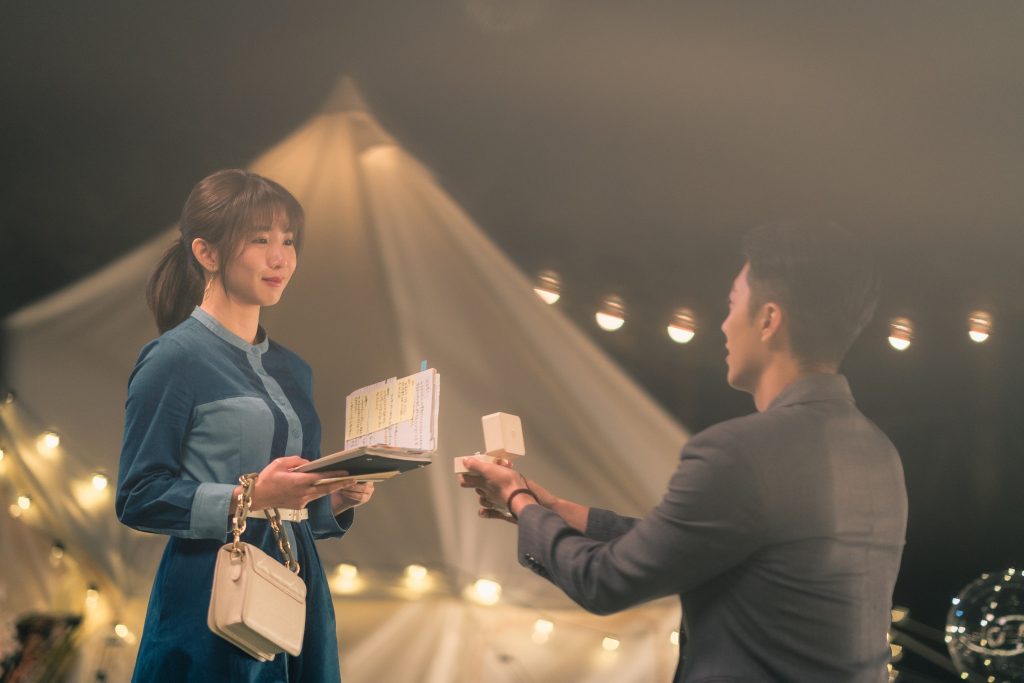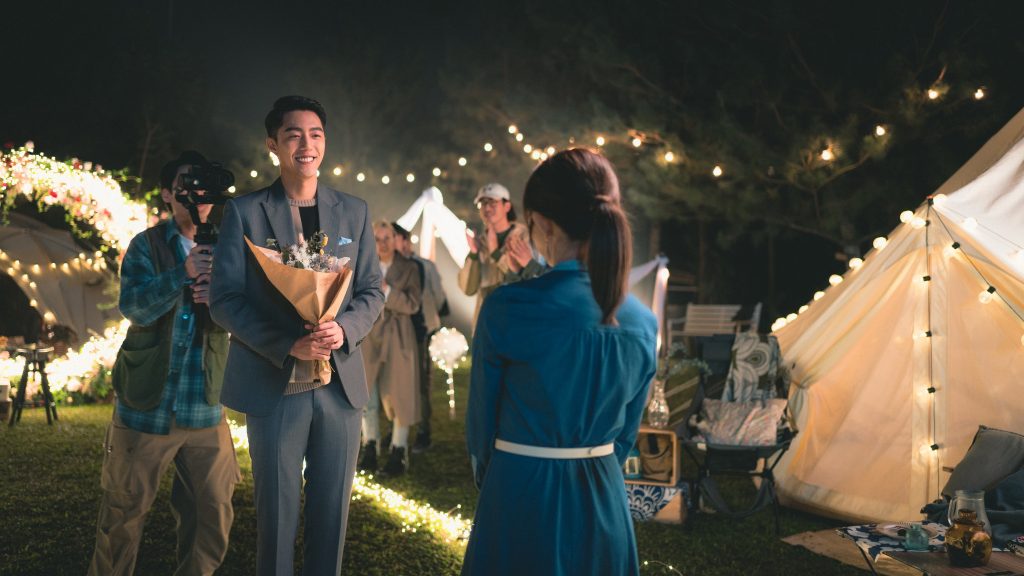Say Yes Again (Zai shuo yi ci wo yuan yi) follows Luke as he embarks upon the task of proposing to his girlfriend Cai. However, the beauty of the film comes from him reliving this event again and again in Harry Shui’s time-loop film. The conflict of the film arises from Luke’s incapacity to realise his immaturity as he constantly relies on his mum for day to day trivialities. Manhood and maturity are central concerns that Luke has to work on within the liminal space of waking up and reliving his day before proposing, making the film an interesting watch.
Nisha-Anne and Digby sat down together over Zoom to chat about the film which is screening via the upcoming SciFi Film Festival.
Spoilers abound.
NA: So what did you think? Were you surprised by it?
D: Well, firstly I was a bit puzzled why it was in the Sci-Fi Film Festival. It didn’t strike me – the concept was sort of sci-fi but I don’t know. Like if someone on the street was telling me [about] this movie and they said, “Oh come to the Sci-Fi Film Festival, there’s this Taiwanese film,” and I sat through that, I’d feel like I had led to believe a lie a bit.
NA: Oh really? Because the fact that it said time-loop stuff – for me, that’s immediately sci-fi.
D: Yeah, I know, but like I’m just so used to high-concept – like I don’t see much sci-fi so I think my experience is quite limited. But it was a cool concept!
NA: Yeah, exactly. Have you seen any other time-loop films?
D: Like what’s that one with Jake Gyllenhaal? By David Bowie’s son, Duncan.
[some googling later]
NA: Source Code!
D: I think I’ve heard of that. Look, this is going to sound grim but I was happy that he – at least in my opinion – he died in the end.
NA: What! Youuu!
D: I think – hear me out – that if his eyes had flickered open, that would have been the most bullshit ending. Because they would have just sold out big-time.
NA: (laughs) You know, I kind of agree but I also don’t agree. Because I really admired the commitment to the grimness of that ending. And I was waiting for him – I was thinking, “Is he going to wake up, is he going to wake up? Ooh, he didn’t wake up! Wow!”
D: Yeah.
NA: But I also hated that.
D: And then it like cuts to the little thing [on his finger] and then it cuts to his eyes and then it cuts back and then it cuts to her and then it cuts to his eyes and you’re constantly thinking, “He’s going to fucken wake up.”
NA: Yeah, totally! (laughs)
D: (laughs)

NA: But I loved that little bit – didn’t we end in the tent and he closes his eyes in the tent?
D: Yeah.
NA: I thought that was so beautiful.
D: I think that was my favourite shot, that aerial shot into the tent.
NA: And all the colours were so beautiful and warm and richcompared to – there were so many cool blues in the rest of the film. I always notice colours like that, especially if they’re blues cos blue’s my favourite colour so I’m like “Ooh yeah, blue!”
D: Yeah, that’s pretty like classic sci-fi, isn’t it?
NA: Yeah, I guess so but I think classic sci-fi would be more of the cold icy metal blue whereas this was more a fresh kind of – I kept thinking water. You know, because we started with that shot of water and then he was a water ski instructor.
D: Yeah.
NA: I love time-loop films. Like I will watch any fricken time-loop film ever, I don’t care. That’s why I was so eager to watch this one. And recently – I mean, I don’t like Groundhog Day because I can’t stand Bill Murray. I find him repulsive. Yeah, I know, blasphemy. But I love Palm Springs.
D: Yeah, I’ve heard of it. I think we missed its distribution in cinemas here.
NA: We did. I think it went straight to thingie, release. So it’s on Amazon, at Prime.
D: Oh. Yeah, I’ll give it a look.
NA: Oh, it’s so good. So there’s Palm Springs – and of course there’s Groundhog Day which everybody goes to and I don’t – and then there’s another film also on Prime which came out just about the time of Palm Springs. And I remember thinking, “Oh that’s bad timing, you guys, because that sounds exactly the same.” But it’s called The Map Of Tiny Perfect Things, and it’s more of a teenage kind of focus. But same sort of concept: somebody’s stuck in a time-loop and trying to figure out how to get out of it, what’s the emotional plane that they need to get to, to get out of it.
So I was really surprised with how long we took to get into the time-loop with this one. Did you find that too?
D: Yeah, it was probably the 40, probably the halfway mark, or maybe the 40, 30 minute mark.
NA: I’m glad you looked at the time because I was struggling so hard. But once it kicked in – actually it took ages for me to kick in too it because I couldn’t connect to the characters. And I didn’t like the tone. You know, that very high comedy – not high comedy, low comedy farcical tone. Did you find that too or were you okay with that?
D: It just reminded me of French comedy a bit. It’s sort of a bit tongue in cheek and sort of nonsensical and pretty dumb and definitely not a comedy that I can relate to.
NA: Yes. Yes. You said something [earlier] about Netflix. You felt like it was geared towards that Netflix kind of audience?
D: Yeah, like I feel like there’s a growing dichotomy between content and cinema now. And I feel like the lines are becoming more blurred as to which is which.
NA: Absolutely.
D: And I feel like a film like [this one] – I cannot see that film working in a cinema.
NA: Oh, okay.
D: Like it seemed like it was more designed for an algorithm that will then play after the last ten seconds of the previous show or something like it.
NA: Whereas when it started and it had that – like you said, that broad comedy aspect, suddenly I realised, you know, is this kind of the Taiwanese equivalent of Bollywood? Where you’ve got the broad farce, broad humour, and then at some point the sci-fi element’s going to come in, and then there’s going to be some emotional drama. You know, that whole mixture of tones. I can see what you’re saying. But I could see it working in cinemas as well, that kind of crowd-pleaser, “let’s have a good time, here’s a love story, bit of sci-fi” kind of thing.
D: Love story with a horrible ending.
NA: I know! What an ending! I was just like, wow, that took some freaking balls, man! But I suppose you can do that in sci-fi which I like.
D: I will say something that I liked about the film was its interrogation of liminal space and, I suppose, a space in between two spaces which you sort of feel is a space where he sits every time he lives out his new day. And I just found it cool how he just like learnt guitar but he kind of didn’t.
I suppose a terminal medical condition often has an end date sort of applied to it. They say you will be expected to live four years and whatnot. So there was this interesting thing where he was unconscious of his own expiration and thought it was something – this other puzzle he had to solve in order to be married. I felt the [concussion explanation] was a bit weak screenwriting, to be honest.
NA: Totally.
D: They didn’t make the jet-skiing look dangerous at all.

NA: And they didn’t really have it – there was only like one scene at the beginning, maybe. It wasn’t really that much of a feature in his life, it wasn’t really set up as a thread all the way through, I thought.
D: But regardless, he’s kind of unconscious of this soon to be fateful experience and he thinks that it’s this other issue that he needs to solve.
Another thing that I liked was the score or the sound design.
NA: Yeah!
D: It was quite goofy and often like dead beats that would go off as if a bad joke had been told.
NA: And then you also had these amazing orchestral swells. I found that actually really beautiful. And how they would switch from those little sound cues, the humorous sound cues, to these amazing dramatic swells of instrumental stuff. Which I kind of liked because it fit in again with that kind of Bollywood thing which I’m familiar with.
D: Yeah, it was a bit operatic.
NA: Did you notice the seahorse?
D: Yeah, I think I did.
NA: I thought that was such a cute little metaphor.
D: Was that when she’s in the aquarium?
NA: No, I didn’t notice it in the aquarium. I noticed all the jellyfish in the aquarium, also because I love jellyfish, I’m covered with jellyfish [tattoos]. No, the seahorse was in his little fish tank and there were two little shots of it. And I remember thinking – you know, with his whole thing about being a good dad, I thought “Oh that’s a nice little subtle thing.” I mean, they didn’t make it overt. But I’m assuming it was intentional. With male seahorses being the ones who carry the young rather than the females.
What did you think of his character arc? That whole idea of him being this immature boy who had to learn to become a man? Or become an adult.
D: I was just thinking about Christopher Nolan’s Memento and like maybe that’s a bit of a time-lapse film. I think his name is Teddy. Guy Pearce kind of creates this conflict in his life to give it meaning because it’s meaningless. And I do wonder if there’s a parallel to this film where he’s kind of making meaning out of nothing.
NA: Yeah, absolutely. I agree. Although I mean, that is movies in itself, isn’t it? That’s pretty much how movie plots work, creating a conflict so we can have a story.
D: Yeah, true.
NA: I actually found that little montage where he suddenly realises that he has to mature — and like you said, with the guitar-playing – I found that quite rushed. But the fact that we had finally switched from all that comedy farce to something human and sweet – I really loved that. I think that was the first time I actually engaged emotionally with the film. And then that fucken final act came out of nowhere and I’m like “What!”
D: Yeah. I found the friend of Cai quite funny and there were some comedic scenes with her.
NA: The queer-coding there was quite interesting and also the fact that the first thing he thinks of is “Oh, are they lovers?” Especially cos the last Taiwanese film – the only other Taiwanese film I’ve ever watched – was a queer drama. So when this happened, this is a mainstream film and they’ve actually got some queer content in here so that’s pretty cool. And I loved the way his little imagining was shot. I was thinking about it earlier because everything else is your cool blues and your fairy lights and stuff, but that little imagining was so glowy and gold and utopian and super romantic and that’s how he was imagining it. Whereas it could have been totally sinister and weird and creepy and homophobic but it wasn’t.
D: Yeah, no, totally.
NA: And actually I was thinking about – you know, the friend like you said – how she looked so different to the other women in the film. They all had their long hair and traditionally modern feminine looks, whereas she had very sharp short hair, and she was in her jacket and trousers. Remember at the end when she has the fight with the guy? (laughs)
D: Yeah, the YouTuber guy.
NA: Yes! He was sweet, I liked that little moment he had in the hospital corridor.
D: Yeah, that was interesting. That made me kind of sad.

NA: I thought Cai could have been a better character. Like on the page — she was very flat. We didn’t know anything about her. We didn’t know what she did, we didn’t see any of her family. You know? Whereas we saw his family and we knew he didn’t do anything because he’s a lazy idiot.
D: Well, I guess we kind of saw her like throwing that party for her boss or whatever.
NA: Yeah, I didn’t even know what that was. Was it a boss? I thought it was a friend. Yeah. But I thought the actress [Kuo Shu Yau] did really well because she sort of made that character a lot more interesting than she probably was on the page. Like she was quite defiant and quite intelligent as well. You know that bit when she comes in and says about the baby in front of his mum? Right at the beginning?
D: Yeah. (laughs)
NA: I didn’t expect that. I thought, “Oh, you’re actually quite cool.” [But] it didn’t help that we didn’t have any subtitles for the text. Like all the signs and the books. I was like “What does the book say? I don’t know what the book says.”



